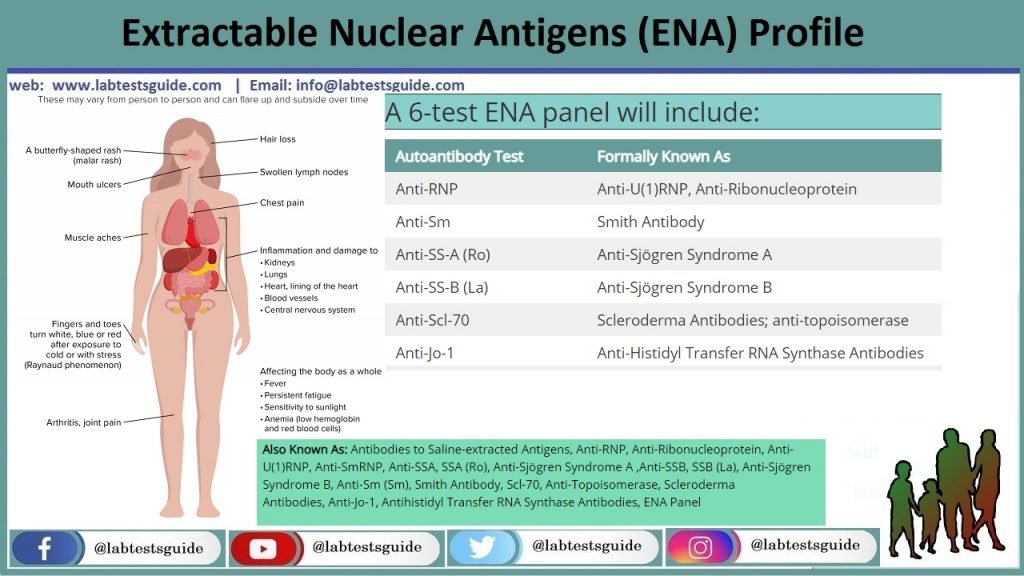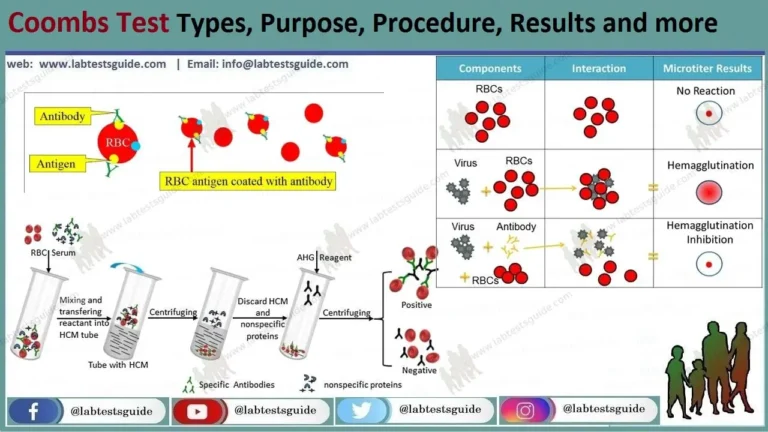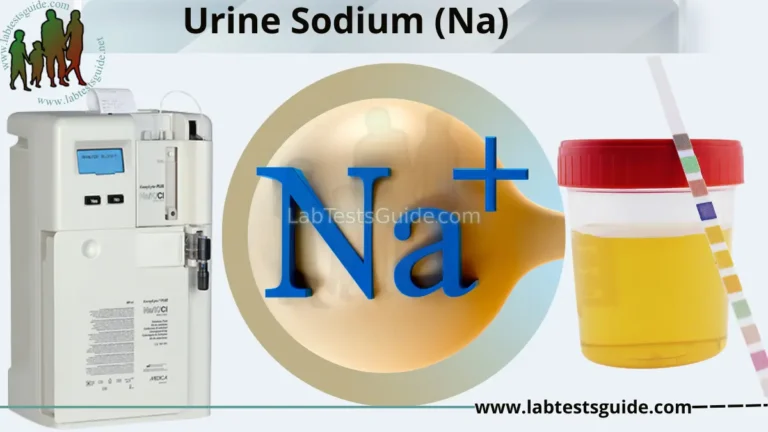Anti-RNP antibodies are directed against the U1 particle of an extractable nuclear antigen (ENA) called ribonucleoprotein, which is made up of a complex of proteins and a small nuclear RNA called U1. The ribonucleoprotein is part of the spplicosome and also includes the Smith antigen (Sm), which is the target of anti-Smith antibody and is often positive on SLE. The anti-RNP test generally involves ELISA for the quantitative measurement of autoantibodies of the immunoglobulin G (IgG) class.

Extractable Nuclear Antigens (ENAs) they are more than 100 different soluble nuclear and cytoplasmic antigens. They are known as “extractable” because they can be removed from cell nuclei using saline and represent six main proteins: Ro, La, Sm, RNP, Scl-70, Jo1. Most ENAs are part of spliceosome or nucleosome complexes and are a type of small nuclear ribonucleoprotein (snRNPS). The location in the nucleus and association with spiceosomes or nucleosomes results in these ENAs associating with additional RNA and proteins, such as polymerases. This quality of ENAs often makes it difficult to purify and quantify their presence for clinical use.
Also Known As: Antibodies to Saline-extracted Antigens, Anti-RNP, Anti-Ribonucleoprotein, Anti-U(1)RNP, Anti-SmRNP, Anti-SSA, SSA (Ro), Anti-Sjögren Syndrome A ,Anti-SSB, SSB (La), Anti-Sjögren Syndrome B, Anti-Sm (Sm), Smith Antibody, Scl-70, Anti-Topoisomerase, Scleroderma Antibodies, Anti-Jo-1, Antihistidyl Transfer RNA Synthase Antibodies, ENA Panel
Formal Name: Extractable Nuclear Antigen Antibodies
Why get tested?
To help diagnose and distinguish between autoimmune disorders, as well as to monitor the progression of autoimmune disease.
When Tested?
- When your antinuclear antibody (ANA) test is positive and you have symptoms that suggest an autoimmune disorder
- When monitoring the activity of an autoimmune disorder
Sample:
- A blood sample drawn from a vein in your arm
- 3 mL Sample in Plain or Yellow Cap Tube
Test Preparations:
No Need any Preparations for This Test
Interpretation:
A normal anti-RNP antibody titer is negative and virtually excludes the diagnosis of mixed connective tissue disease (MCTD).
Sensitivities of anti-RNP antibody in various rheumatologic diseases are as follows:
- MCTD: 95%-100%
- Systemic lupus erythematosus (SLE): 38%-44%
- Discoid lupus erythematosus: 20%-30%
- Scleroderma: 20%-30%
- Rheumatoid arthritis: 10%
Reference Range:
Because normal and abnormal ranges depend on the laboratory used, it is important to analyze results according to guidelines established by the laboratory running the sample. For example, according to one laboratory, the following parameters are accepted:
A negative anti-RNP antibody result is defined as less than 20 U based on enzyme-linked immunoassay (ELISA).
- A borderline result is defined as 20-25 U.
- A positive result is defined as more than 26 U.
A 4-test ENA panel will include:
| Autoantibody Test | Formally Known As |
|---|---|
| Anti-RNP | Anti-U(1)RNP, Anti-Ribonucleoprotein |
| Anti-Sm | Smith Antibody |
| Anti-SS-A (Ro) | Anti-Sjögren Syndrome A |
| Anti-SS-B (La) | Anti-Sjögren Syndrome B |
A 6-test ENA panel will include:
| Autoantibody Test | Formally Known As |
|---|---|
| Anti-RNP | Anti-U(1)RNP, Anti-Ribonucleoprotein |
| Anti-Sm | Smith Antibody |
| Anti-SS-A (Ro) | Anti-Sjögren Syndrome A |
| Anti-SS-B (La) | Anti-Sjögren Syndrome B |
| Anti-Scl-70 | Scleroderma Antibodies; anti-topoisomerase |
| Anti-Jo-1 | Anti-Histidyl Transfer RNA Synthase Antibodies |
When this Test Ordered
An ENA panel is ordered when a person has signs and symptoms that could be due to an autoimmune disorder and has a positive ANA test. The signs and symptoms of autoimmune disorders are highly variable and can affect many different areas of the body. They may include:
- Fever and persistent fatigue
- Muscle pain
- Joint swelling and/or pain
- Skin rash
- Hair loss or loss of scalp hair
- Sensitivity to ultraviolet light
- Raynaud phenomenon
- Protein in the urine (proteinuria)
- Neurologic symptoms such as seizures, depression, psychoses
- Hemolytic anemia (low red blood cell count) or leukopenia (low white blood cell count)
| Autoantibody Test | Results That Support an Autoimmune Disorder Diagnosis |
|---|---|
| Anti-RNP | Positive result seen in 95-100% of mixed connective tissue disease (MCTD) cases; may also be positive with lupus and scleroderma |
| Anti-Sm | Positive result seen in 30% of those with lupus; very specific antibody marker for this disease |
| Anti-SS-A (Ro) | Positive result seen in 75% of those with Sjögren syndrome; may also be positive with lupus and scleroderma |
| Anti-SS-B (La) | Positive result seen in 60% of those with Sjögren syndrome; may also be positive with lupus and scleroderma; rarely present without anti-SS-A |
| Anti-Scl-70 | Positive result seen in 60% of those with scleroderma; highly specific antibody marker for this disease |
| Anti-Jo-1 | Positive result seen in 30% of those with polymyositis; may be positive with pulmonary fibrosis |
Possible References Used




